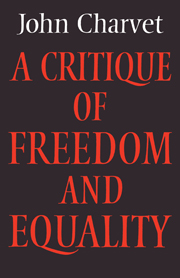Summary
In this work ideas of human freedom and equality are understood to be integral expressions of the dominant modern conception of the basis of moral and political life. The aim of the work is in the first place to show that the notions of freedom and equality must be taken together in the idea of the equal value of individuals as free or self-determining beings, and yet that this necessary combination of equality and freedom cannot be elaborated into a coherent system of ethical thought. The principles of freedom and equality are as much opposed to each other as they require each other. From this I conclude that they cannot be the fundamental principles in terms of which we can account adequately for our ethical experience. Part I is thus a critical and negative argument.
In Part II I consider the views of two major theorists who also reject individualist conceptions of freedom and equality, Hegel and Marx. My concern is to show how their accounts of the basis of moral experience, while doing justice to its communal nature, fail to leave an adequate place for the particular individual. In Part III I offer my own account of how the basis of our ethical experience is to be construed. This account, while rejecting the individualist position, will be seen both to owe much to it and to give a more determinate and coherent explanation for many of the moral and political practices associated with that position. Crudely, not individuals but men's associated wills in community constitute the basis of our ethical experience.
- Type
- Chapter
- Information
- A Critique of Freedom and Equality , pp. 1 - 10Publisher: Cambridge University PressPrint publication year: 1981

